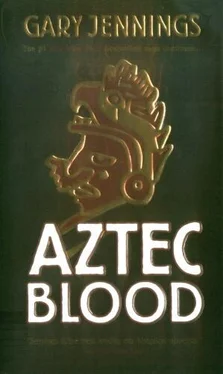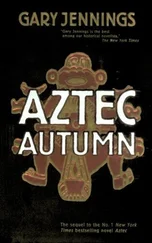Gary Jennings - Aztec Blood
Здесь есть возможность читать онлайн «Gary Jennings - Aztec Blood» весь текст электронной книги совершенно бесплатно (целиком полную версию без сокращений). В некоторых случаях можно слушать аудио, скачать через торрент в формате fb2 и присутствует краткое содержание. Жанр: Старинная литература, на английском языке. Описание произведения, (предисловие) а так же отзывы посетителей доступны на портале библиотеки ЛибКат.
- Название:Aztec Blood
- Автор:
- Жанр:
- Год:неизвестен
- ISBN:нет данных
- Рейтинг книги:4 / 5. Голосов: 1
-
Избранное:Добавить в избранное
- Отзывы:
-
Ваша оценка:
- 80
- 1
- 2
- 3
- 4
- 5
Aztec Blood: краткое содержание, описание и аннотация
Предлагаем к чтению аннотацию, описание, краткое содержание или предисловие (зависит от того, что написал сам автор книги «Aztec Blood»). Если вы не нашли необходимую информацию о книге — напишите в комментариях, мы постараемся отыскать её.
Aztec Blood — читать онлайн бесплатно полную книгу (весь текст) целиком
Ниже представлен текст книги, разбитый по страницам. Система сохранения места последней прочитанной страницы, позволяет с удобством читать онлайн бесплатно книгу «Aztec Blood», без необходимости каждый раз заново искать на чём Вы остановились. Поставьте закладку, и сможете в любой момент перейти на страницу, на которой закончили чтение.
Интервал:
Закладка:
"You have not earned your second pouch of gold. I need more information."
"Do you wish me to lie?"
"My desire is that you dig into your memory and tell me more about the man named Luis. I want to know if you ever saw him in the company of the man who paid the constable for your release."
She thought for a moment. "No, I never saw them together." She stopped and faced me. "My memory is coming back. If you give me that second pouch of gold, I will tell you the name of the person who bought my freedom."
I gave her the pouch.
"Miguel de Soto."
Eh, the man who bought and sold workers for the tunnel project, Ramon de Alva's brother-in-law.
Catalina hurried away from me, perhaps to pull her pubic hair for the widow, but I did not bother calling after her. I had made a connection between Luis, Alva, the silver robberies, and the tunnel project. It was not evidence I could go to the authorities with. With my sins, real and imagined, I could not have gone to them if God had been my witness.
My mind flashed to little Juana naked on a rack being examined by devils in priest's robes, and the courageous don being marched toward his fiery death.
It was time to return to New Spain.
Mateo was out of the city. I knew that he was elated about being back in Spain, among his own. I would not disturb him, but leave word with Ana. I would miss my compadre, but in the great circle of life, perhaps we would meet again.
I had heard that one of the lobo ships that ply the Caribbean was sailing soon for Cuba. From there I could get passage to Veracruz.
PART SIX
...he wanted nothing but a lady, on whom he might bestow the empire of his heart...
Miguel Cervantes, Don Quixote
ONE HUNDRED AND THIRTEEN
The voyage from Seville to Veracruz took three weeks aboard a dispatch boat. Sent ahead of the treasure fleet, the boat was to notify New Spain that the fleet had set sail.
Two years had passed since I watched Veracruz fade from view and drop beneath the horizon line. Now the snow-capped volcanic cone of Citlaltépetl, the highest mountain in New Spain, appeared apparitionlike above that same horizon's rim, a white solitary finger, beckoning me to God only knew what.
New Spain had been a hard master, killing almost everything I'd cared about. The only woman I would love—a creature of radiant grace and poetic sensibility—was sentenced to a marital servitude as thoroughly abominable, for someone of her sensitivity, as my own years in the colony's dungeons and mines.
Still, New Spain was my home. Staring at that white, beckoning finger of volcano, my heart begrudgingly softened. Seville was a proud and grand city, one of the cornerstones of a great European empire, but my heart and soul were bound to the New World with hoops of steel. That hard, benighted land had brought my Aztec ancestors sustenance, had made me who I was and what I might become. And despite its whips and racks and dungeons and mines, it had taught me courage, loyalty, friendship, honor, even learning. Against all odds, I had prospered. I was returning home a rich and cultured gentleman.
Yes, I was returning home.
The pleasure of my return, however, was tempered by my debt of retribution. I did not want eye for an eye but a head for an eye—and the revenge I sought for the killers of Fray Antonio, Don Julio, and his family never left my side, not once, not for a heartbeat. Bloody revenge was my closest companion, my most intimate ally.
As soon as I resolved to return, my dreams of vengeance took wing. A scheme had burned in my brain since departing Veracruz, and now it flowered... relentlessly... incessantly... like the fatal nightshade. Like the Healer's snake trap and Don Julio's blood rite, I saw a way to bring these murderers to terms—and destroy them root and branch.
As the dispatch vessel dropped anchor in the channel between the island fortress of San Juan de Ulúa and the city, my twenty-fifth birthday came around. I spent the morning of that birthday interviewed by a customs officer and an inquisitor from the Holy Office. I had been careful to bring nothing with me that would offend anyone. The only book in my baggage was a history of the life of San Francis, a genuine history, not the type I once printed with a saintly title and a salacious text.
Before leaving Seville I had chosen a name and background for myself but abandoned both at sea. A better opportunity arose in the guise of a young man close to my own age. The third son of an impoverished Spanish nobleman, he had fled Spain to avoid the priesthood. He jumped ship when, after being blown off course, we briefly dropped anchor off an idyllic isle. His plan for life was to spend his days on the island, basking in the sun in the arms of native girls. Don Carlos, a name I found suitable, was an easygoing rascal who had been talkative about his family and history during our weeks together. I soon knew the name of his father and mother, brothers and sister, family history, and status in the community. On the pretense of planning to purchase a New World house that would evoke a fine Spanish style, I had him draw me a floor plan of his family home and coat of arms.
Well-dressed, respectable, well-mannered, with no contraband but with the unmistakable arrogance of an hidalgo, I quickly passed muster. I granted each official the modest gratuity that only the truly honest render.
A ship's tender carried me to the jetty. I saw that the merchants were already piling their goods on the dock. The silver treasure was already in the city, stored in a locked room in the alcalde's palace—or would be here soon. The treasure fleet was not due for a week, but ships had been spotted from the island fortress in the bay with a spyglass. God had blessed it with favorable winds. Soon the fleet would arrive, unload, and then commence reloading.
For my stay in Veracruz, I chose the inn at the main plaza, the very one that I had once fought for the right to beg in front of. None of the harbor léperos who pleaded with me for alms were familiar to me. That was not a surprise—the life span of a lépero is often brief. I had left Veracruz as a boy of fifteen, and now I was a man almost twice that age. Léperos are frequently swept away by life in the gutter, enslavement in the mines and cane fields, as well as the waves of vómito fever and the other pestes that plague the city.
I tossed the beggars a few coppers. It would have amused me to reward them with some silver, but such benevolence would have drawn both suspicion and thieves. Not that I feared recognition. I had left Veracruz as a boy. During my subsequent years in Mexico, I favored a heavy beard and long hair. Clean-shaven, facially scarred, my hair not only short but streaked prematurely gray, I was not the same person as Cristo the Bastardo. I was Don Carlos, a hidalgo, the son-of-somebody, seeking his fortune in the New World, perhaps by marriage to the daughter of a rich merchant who was willing to give a fat dowry to add the son-of-somebody to the family tree.
But beyond mere clothes, money, and hair, I would not be recognized. Two years in Seville had taught me not to act like a Spaniard but to be one. As the Healer would say, I now "smelled" like a gachupin. The color of my skin was darker than many Spaniards, but the Iberian Peninsula had hosted so many peoples—from Romans and Visigoths, to Moors and Gypsies—for so many centuries that its people's skin color ranged from white-as-milk to café con leche. The disparity in skin color was only one reason why bloodlines, not appearance, determined people's worth.
As with all travelers in this region, I was anxious to get out of the hot, humid, sickly city and into the cool mountains beyond the dunes. But first I would need a horse, pack animals, servants, and supplies.
Читать дальшеИнтервал:
Закладка:
Похожие книги на «Aztec Blood»
Представляем Вашему вниманию похожие книги на «Aztec Blood» списком для выбора. Мы отобрали схожую по названию и смыслу литературу в надежде предоставить читателям больше вариантов отыскать новые, интересные, ещё непрочитанные произведения.
Обсуждение, отзывы о книге «Aztec Blood» и просто собственные мнения читателей. Оставьте ваши комментарии, напишите, что Вы думаете о произведении, его смысле или главных героях. Укажите что конкретно понравилось, а что нет, и почему Вы так считаете.











